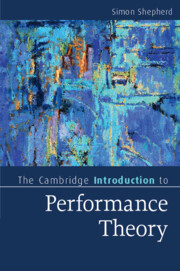Book contents
- Frontmatter
- Contents
- Preface
- Part I Definitions of performance
- Part II The emergence of performance as sensuous practice
- Part III Theorising performance
- 15 Performance, postmodernism and critical theory
- 16 What Performance Studies is: version 1: New York and Northwestern
- 17 What Performance Studies is: version 2: Oral interpretation
- 18 How Performance Studies emerged
- 19 Gender performativity
- 20 Performance and performativity
- 21 The relations between performance, theatre and text
- 22 The magic of performance
- Closing note
- References
- Index
- Cambridge Introductions to …
16 - What Performance Studies is: version 1: New York and Northwestern
from Part III - Theorising performance
Published online by Cambridge University Press: 05 February 2016
- Frontmatter
- Contents
- Preface
- Part I Definitions of performance
- Part II The emergence of performance as sensuous practice
- Part III Theorising performance
- 15 Performance, postmodernism and critical theory
- 16 What Performance Studies is: version 1: New York and Northwestern
- 17 What Performance Studies is: version 2: Oral interpretation
- 18 How Performance Studies emerged
- 19 Gender performativity
- 20 Performance and performativity
- 21 The relations between performance, theatre and text
- 22 The magic of performance
- Closing note
- References
- Index
- Cambridge Introductions to …
Summary
In the same year as Reinelt and Roach's book, at the annual conference of the USA's Association for Theatre in Higher Education (ATHE) at Atlanta, the relationship of performance and theatre was brought under new discipline. A member of the New York University Graduate Department of Performance Studies, Richard Schechner, suggested from the podium that theatre departments should change their focus and their names. The business of offering training ‘for the orthodox theatre’ was, he said, neither economically nor academically ‘acceptable’: ‘The new paradigm’ is ‘performance’, not theatre. Theatre departments should become ‘performance departments’. By studying performance rather than theatre these departments could engage with a wider range of material, ‘a broad spectrum’, that included ‘entertainments, arts, rituals, politics, economics, and person-to-person interactions’ (in Dolan 1995: 30).
The variety of performance study
This speech was not entirely welcomed. For those in other departments already deeply thinking about the definition of the subject area, the call to arms by the man at the podium may well have seemed somewhat impertinent. Some assumed it was less about academic innovation but was instead more of a bid to claim institutional territory. For as we know the academic debates around performance and theatre had been going on in different places for at least a decade, and change of various sorts was well under way. Some of it was being driven by the work we have already noted, namely the engagement with new theoretical models and political positions such as feminism (Auslander 1997, Case 1992, Dolan 1995). A second force for change came from some of the constituent members of the National Communication Association (NCA), previously known, prior to 1997, as the National Association of Academic Teachers of Public Speaking. Within this association its Interpretation Division provided a forum for ‘teachers and scholars of performance-based literary study who worked outside the institutional boundaries of “English” and “theatre”’. This work is often referred to as ‘oral interpretation’, a combination of rhetoric and textual analysis. In 1991 the Interpretation Division changed its name to the Performance Studies Division, thereby, as Edwards notes, ‘cultivating what appears to be the first national association of Performance Studies scholars out of its deep roots in literary study, speech arts, and elocutionary training’.
- Type
- Chapter
- Information
- The Cambridge Introduction to Performance Theory , pp. 151 - 166Publisher: Cambridge University PressPrint publication year: 2016



